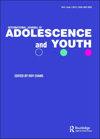2019冠状病毒病大流行之前和期间瑞士青少年的复原力模式:潜在过渡分析
IF 2.2
Q3 PSYCHOLOGY, DEVELOPMENTAL
International Journal of Adolescence and Youth
Pub Date : 2022-06-24
DOI:10.1080/02673843.2022.2091938
引用次数: 6
摘要
摘要本研究调查了新冠肺炎时期瑞士早期青少年的恢复力模式和这些模式的预测因素(即性别和移民背景)。共有317名学生在两个时间点参加。我们使用心理健康问题和保护因素作为指标,进行了两次单独的潜在阶级分析和一次潜在转变分析。结果显示,有三组人:有弹性(高心理健康问题,高保护因素)、无弹性(高精神健康问题,低保护因素)和无烦恼(低心理健康问题、高保护因子)。弹性组最稳定(91%的稳定性),而无障碍组最不稳定(69%的稳定性)。在第二个时间点,男孩比其他组更有可能成为无烦恼组的一员。第一时间点的性别和两个时间点的移民背景作为预测因素并不显著。研究结果强调了针对特定群体的研究、健康促进和干预措施的重要性。本文章由计算机程序翻译,如有差异,请以英文原文为准。
Resilience patterns of Swiss adolescents before and during the COVID-19 pandemic: a latent transition analysis
ABSTRACT This study investigated resilience patterns and predictors of these patterns (i.e. gender and migration background) among Swiss early adolescents in times of COVID-19. A total of 317 pupils participated at two time points. We conducted two separate latent class analyses and a latent transition analysis using mental health issues and protective factors as indicators. The results revealed three groups: resilient (high mental health issues, high protective factors), nonresilient (high mental health issues, low protective factors), and untroubled (low mental health issues, high protective factors). The resilient group was the most stable (91% stability), whereas the untroubled was the least stable (69% stability). Boys were more likely to be part of the untroubled group than the other groups at the second time point. Gender at the first time point and migration background at both time points were nonsignificant as predictors. Findings highlight the importance of group-specific research, health promotion, and interventions.
求助全文
通过发布文献求助,成功后即可免费获取论文全文。
去求助
来源期刊

International Journal of Adolescence and Youth
PSYCHOLOGY, DEVELOPMENTAL-
CiteScore
8.80
自引率
2.20%
发文量
32
审稿时长
9 weeks
期刊介绍:
nternational Journal of Adolescence and Youth aims to identify, examine and compare particular issues, problems and policies related to adolescents and youth throughout the world. Subject areas covered include psychological growth and development, health and medical care, delinquency, social policy, employment and unemployment, education and training, spiritual and physical development, leisure, family relationships, sex education, homelessness. The Journal will be of interest to researchers in those areas, university and other higher education institutions, as well as to international, central and local government and voluntary organizations and field work agencies.
 求助内容:
求助内容: 应助结果提醒方式:
应助结果提醒方式:


